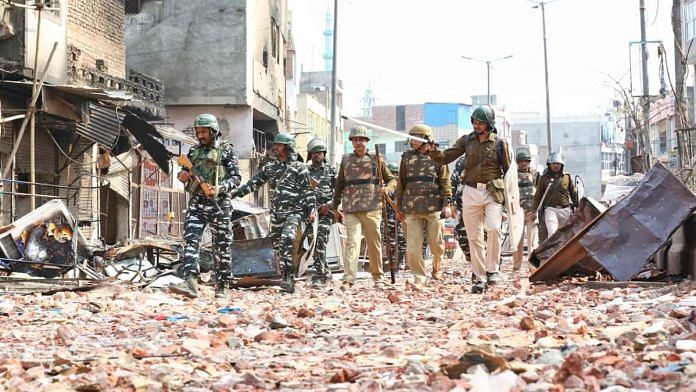 The Delhi darkness: Our republic cannot become what our rulers want it to
The Delhi darkness: Our republic cannot become what our rulers want it to
Pratap Bhanu Mehta| Contributing Editor
The Indian Express
Mehta describes the violence in Delhi as “an event in a larger chain”. He argues that the republic, as we know it, is being replaced with a “regime that thrives on cruelty, fear, division and violence”. He argues that the Supreme Court has failed to protect the constitution and other institutions, and the media has also “failed to put the requisite pressure on the government.” He warns that there is a “political vacuum” in the country since the “minorities cannot turn to any electoral formation… to provide even basic protection” and it is bound to be filled by forces we cannot predict.

Capital Omen
Najeeb Jung | Former lieutenant governor of Delhi
The Indian Express
Jung argues that Home Minister Amit Shah’s belligerent speeches in Parliament and during election campaigns “fuelled fears of a life bereft of home and hearth”. He notes, “Minorities in India are slowly coming to believe that there is a campaign to make them second-class citizens” and this “perception must be dispelled”. He advises the government to “immediately take steps to initiate dialogue on these fraught issues” and “engage political parties, teachers, journalists and other opinion-makers and immediately start a dialogue.
 Address the deepfake
Address the deepfake
Ananth Padmanabhan | Dean, Academic Affairs, Sai University and visiting fellow, Centre for Policy Research
Hindustan Times
Padmanabhan comments on the emergence of deepfakes in politics after BJP used the technique during the Delhi assembly elections. Deepfakes are synthetic media that uses techniques from machine learning and artificial intelligence to manipulate or generate visual and audio content with a high potential to deceive. He highlights three reasons why deepfakes are worrisome — the compelling narrative a moving image contributes to, refuting deepfakes videos is tough since it uses artificial intelligence and the attraction of deepfakes for political campaigns. He warns that “regulators such as the Election Commission must act before this becomes an unmanageable crisis”.
 The battle against coronavirus: Solidarity and cooperation among countries are our most formidable weapons
The battle against coronavirus: Solidarity and cooperation among countries are our most formidable weapons
Poonam Khetarpal Singh | Regional Director of World Health Organisation, South-East Asia
The Times of India
Singh calls for cooperation in the South Asian region in the battle against coronavirus. She argues that “each country in the region has different strengths and faces different risks” and sharing “knowledge and resources, countries will build surge capacity”. She suggests, “Countries must continue to report and share information on suspected cases early and provide detailed reports on confirmed cases.”
 The strategic use of social ties to contain the spread of a disease
The strategic use of social ties to contain the spread of a disease
Biju Dominic | CEO, Final Mile Consulting, a behaviour architecture firm
Mint
Dominic uses an anthropological framework known as “strong ties, weak ties” to explain the spread of information, diseases and behaviours during a public health crisis such as the coronavirus. Public policy should focus less on “conventional” awareness campaigns about the disease and more on “activating weak ties in a society to alter behaviour patterns”.
 Indian pharma catches China’s COVID sickness
Indian pharma catches China’s COVID sickness
Amitendu Palit | Senior Research Fellow, Institute of South Asian Studies, NUS
The Financial Express
Palit predicts that if the coronavirus pandemic is prolonged, the Indian pharma industry may suffer due to “lack of supplies” from China, especially if “bulk drug stocks” dry up. He explains how the Indian pharma industry is heavily reliant on China for antibiotics, especially penicillin, rifampicin, 6-APA and various others.
 Still no finality, the third time round
Still no finality, the third time round
Sushanta Talukdar | Editor, nezine.com, a bilingual online magazine on the Northeast
The Hindu
Talukdar argues, “the new Bodo accord does not spell closure of the statehood movement by Bodo group” and it “triggered the intensification of the movement for Kamatapur State by organisations of the Koch-Rajbongshi community.” He warns that it is too early to celebrate and “peace will continue to be fragile in Assam’s Bodo heartland until an all-inclusive power-sharing and governance model is evolved under the provisions of the Sixth Schedule.”
 RBI, better stick to your brief
RBI, better stick to your brief
Ateesh Tankha | Former head, partnerships and Citi merchant service, Citibank, US
The Economic Times
Tankha discusses RBI governor Shaktikanta Das’s vision for the future of banking and fintech in India. He recommends that instead of encouraging banks and fintechs to collaborate on “designing products” and improving their services, RBI “may want to focus on charting a vision for more stringent oversight and consumer protection.”.
 A new normal has now been set for India-US relations
A new normal has now been set for India-US relations
Harsh V. Pant | Professor of international relations, King’s College London
Mint
Pant debunks the assumption that US President Donald Trump’s visit to India was “all optics and lacked substance”. The two countries signed 3 MoUs, “including one in the energy sector, and agreed to initiate talks on a major trade deal”, he argues. Modi and Trump have managed to give the Indo-US relationship “a strategic coherence” that was previously missing, he adds.
 A visit like no other
A visit like no other
Shyam Saran | Former foreign secretary and a senior fellow, CPR
Business Standard
Saran also finds Trump’s visit substantial given his “remarkable restraint in not berating the Indian side on trade issues” and by having a “forward-looking and optimistic” attitude. Apart from Modi and Trump’s “personal chemistry”, the substantive gains of the visit lie on the “political and security side,” he writes.
 Too early to value LIC
Too early to value LIC
Mohan R. Lavi | Chartered accountant
Hindu Business Line
Even though the government announced its plans to disinvest its stake in LIC, the company is “not ready for disinvestment yet and the financial information available is insufficient to attempt a valuation”, argues Lavi. Lavi tries to estimate what the valuation may be and notes, “LIC could probably fit into a slot between SBILIC and HAL”, translating into an “expected” IPO price of ₹950 per share.
Today’s Editorials
The Hindu: Hindu says US President Donald Trump’s visit can be divided into two parts — the symbolism of the joint rally and the actual outcomes. There were a few major deals signed, including defence purchases and buying nuclear reactors, however, the next step in the Indo-Pacific partnership was not discussed. The daily suggests that the two nations complete the unfinished agreements and move towards the much-anticipated trade deal.
The Times of India: TOI notes, BJP has accommodated the sentiments expressed by other parties in Bihar by allowing the passage of an assembly resolution against the NRC unanimously. TOI states that this pragmatism is in BJP’s self interest as it has to build bridges with its opponents.
The Indian Express: The death of 11 children in Jammu’s Udhampur district due to a cough syrup requires plugging loopholes in the country’s drug regulatory regime, writes Express. India is the largest supplier of generic medicines in the world, however, the pharma industry has never answered questions about the quality of its product.
Hindustan Times: The Supreme Court putting off the Shaheen Bagh hearing till 23 March shows that the court doesn’t believe that it is a burning issue, writes HT. Given the current circumstances in Delhi, HT demands that there should be a final verdict as soon as possible. Meanwhile, Shaheen Bagh remains both the most successful sit-in movement in the world and a ticking time bomb, it notes.



